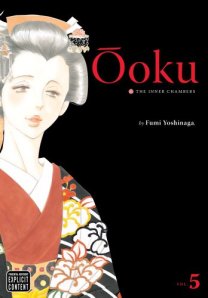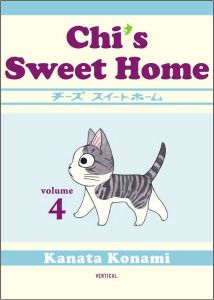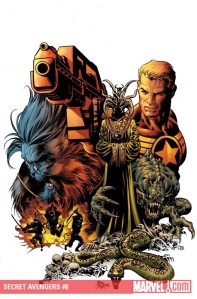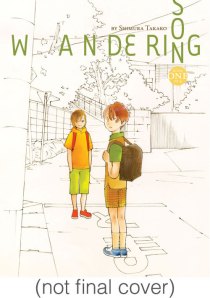Submissions are being accepted for the 2011 Eisner Awards! I enjoyed cobbling a list of suggested manga nominations last year, so I thought I’d try again.

 There could be a number of Japanese works that make it into the Best Short Story category, as both Fantagraphics and Top Shelf published highly regarded collections of short manga. If forced to pick just one story from Moto Hagio’s A Drunken Dream and Other Stories, I think it would have to be “Hanshin/Half-God.” There’s a lot of terrific work in Top Shelf’s AX anthology, but the one that keeps coming to mind would have to be Akino Kondo’s “The Rainy Day Blouse & the First Umbrella.”
There could be a number of Japanese works that make it into the Best Short Story category, as both Fantagraphics and Top Shelf published highly regarded collections of short manga. If forced to pick just one story from Moto Hagio’s A Drunken Dream and Other Stories, I think it would have to be “Hanshin/Half-God.” There’s a lot of terrific work in Top Shelf’s AX anthology, but the one that keeps coming to mind would have to be Akino Kondo’s “The Rainy Day Blouse & the First Umbrella.”
 Whether or not any Japanese titles show up in the Best Continuing Comic Book Series category is always kind of a crap shoot. If one shows up, there’s a good chance it’s probably by Naoki Urasawa, so I wouldn’t be surprised or at all displeased if we saw 20th Century Boys or Pluto (Viz) in this roster. I would be surprised and delighted if we saw that stalwart, The Kurosagi Corpse Delivery Service (Dark Horse), written by Eiji Otsuka and illustrated by Housui Yamazaki, take a slot. The same goes for Eiichiro Oda’s One Piece (Viz), which experienced a big push this year and put Oda’s multifaceted gifts on flattering display.
Whether or not any Japanese titles show up in the Best Continuing Comic Book Series category is always kind of a crap shoot. If one shows up, there’s a good chance it’s probably by Naoki Urasawa, so I wouldn’t be surprised or at all displeased if we saw 20th Century Boys or Pluto (Viz) in this roster. I would be surprised and delighted if we saw that stalwart, The Kurosagi Corpse Delivery Service (Dark Horse), written by Eiji Otsuka and illustrated by Housui Yamazaki, take a slot. The same goes for Eiichiro Oda’s One Piece (Viz), which experienced a big push this year and put Oda’s multifaceted gifts on flattering display.
 The Best New Series category is tricky for similar reasons. You never know how they’ll define the category, and, hey, it’s not like the rest of the comics industry is hurting for good new titles. But if they want to mix it up with some newly launched (here, at least) manga series, here are four they might consider:
The Best New Series category is tricky for similar reasons. You never know how they’ll define the category, and, hey, it’s not like the rest of the comics industry is hurting for good new titles. But if they want to mix it up with some newly launched (here, at least) manga series, here are four they might consider:
Twin Spica (Vertical), Kou Yaginuma’s heartfelt examination of a school for astronauts
Bunny Drop (Yen Press), Yumi Unita’s observant take on single fatherhood
House of Five Leaves (Viz), Natsume Ono’s alluring tale of an unemployed samurai who falls in with the right/wrong crowd
Cross Game (Viz), Mitsuru Adachi’s coming-of-age baseball drama.
 Technically speaking, neither of the following titles was originally conceived of for kids, but I have no problem putting them forward as likely candidates for the Best Publication for Kids category. Konami Kanata’s Chi’s Sweet Home (Vertical) is charming and funny, and it offers a point-by-point run-through of the responsibilities of pet ownership, which is a great thing to hand a kid. Very few people don’t like Kiyohiko Azuma’s Yotsuba&! (Yen Press) for the simple reasons that it’s hysterically funny and wide open to just about anyone who cares to read it. It’s the kind of book that I think people want to read with the kids in their lives, which is certainly an enticement for voters.
Technically speaking, neither of the following titles was originally conceived of for kids, but I have no problem putting them forward as likely candidates for the Best Publication for Kids category. Konami Kanata’s Chi’s Sweet Home (Vertical) is charming and funny, and it offers a point-by-point run-through of the responsibilities of pet ownership, which is a great thing to hand a kid. Very few people don’t like Kiyohiko Azuma’s Yotsuba&! (Yen Press) for the simple reasons that it’s hysterically funny and wide open to just about anyone who cares to read it. It’s the kind of book that I think people want to read with the kids in their lives, which is certainly an enticement for voters.
 If there’s a category that’s hard to pin down, it would probably be Best Publication for Teens, partly because I don’t think teens really like being told “We know you’ll like this.” So I’ll go with two that are rated “Teen,” because I’m lazy like that. Cross Game has pretty much everything you could ask for from a coming-of-age novel: joy, sorry, confusion, comedy, great characters, and completely recognizable slices of life. Yuki Midorikawa slices up a more supernatural life with Natsume’s Book of Friends (Viz), but it has hearts and smarts in common with Adachi’s baseball comic.
If there’s a category that’s hard to pin down, it would probably be Best Publication for Teens, partly because I don’t think teens really like being told “We know you’ll like this.” So I’ll go with two that are rated “Teen,” because I’m lazy like that. Cross Game has pretty much everything you could ask for from a coming-of-age novel: joy, sorry, confusion, comedy, great characters, and completely recognizable slices of life. Yuki Midorikawa slices up a more supernatural life with Natsume’s Book of Friends (Viz), but it has hearts and smarts in common with Adachi’s baseball comic.
 Not much has changed as far as my Best Humor Publication recommendations go, at least in relation to Koji Kumeta’s Sayonara Zetsubou-Sensei (Del Rey). The aforementioned Yotsuba&! is routinely one of the funniest comics I read, and Kiminori Wakasugi’s Detroit Metal City (Viz) has a lot of vulgar high points.
Not much has changed as far as my Best Humor Publication recommendations go, at least in relation to Koji Kumeta’s Sayonara Zetsubou-Sensei (Del Rey). The aforementioned Yotsuba&! is routinely one of the funniest comics I read, and Kiminori Wakasugi’s Detroit Metal City (Viz) has a lot of vulgar high points.
Unless there’s some utterly arcane bit of rules of which I’m unaware, there’s no reason on Earth for AX not to snag a Best Anthology nomination. It’s everything an anthology or collection is supposed to be, isn’t it? Purposeful, varied, significant, with bonus points for being frequently entertaining and nicely produced.
 Nominees in the Best Archival Collection apparently need to focus on work that’s at least 20 years old, so I suspect that might disqualify A Drunken Dream and Other Stories, but there’s plenty of material to choose from. Osamu Tezuka’s Ayako (Vertical) is perhaps not my favorite of his works, but there’s always Black Jack from the same publisher. There’s also Yoshihiro Tatsumi’s Black Blizzard (Drawn & Quarterly), which offers a worthwhile glimpse into his earlier, long-form works.
Nominees in the Best Archival Collection apparently need to focus on work that’s at least 20 years old, so I suspect that might disqualify A Drunken Dream and Other Stories, but there’s plenty of material to choose from. Osamu Tezuka’s Ayako (Vertical) is perhaps not my favorite of his works, but there’s always Black Jack from the same publisher. There’s also Yoshihiro Tatsumi’s Black Blizzard (Drawn & Quarterly), which offers a worthwhile glimpse into his earlier, long-form works.
 Best U.S. Edition of Foreign Material — Asia opens its own can of worms for me in terms of recommendation, because what I’d suggest would depend on what’s nominated elsewhere. I’m always for spreading the wealth, if possible. Assuming there’s an absence of comics from Japan in the other categories, I’d say these five are essential, though: A Drunken Dream an Other Stories (Fantgraphics), AX (Top Shelf), Bunny Drop (Yen Press), Twin Spica (Vertical), and Cross Game (Viz).
Best U.S. Edition of Foreign Material — Asia opens its own can of worms for me in terms of recommendation, because what I’d suggest would depend on what’s nominated elsewhere. I’m always for spreading the wealth, if possible. Assuming there’s an absence of comics from Japan in the other categories, I’d say these five are essential, though: A Drunken Dream an Other Stories (Fantgraphics), AX (Top Shelf), Bunny Drop (Yen Press), Twin Spica (Vertical), and Cross Game (Viz).
 It’s unfortunate that the Best Writer/Artist categories are divided into Humor and Drama, because the greats balance both. I would love to see Fumi Yoshinaga nominated, possibly in the humor side of the equation. Still, her year included All My Darling Daughters (Viz), new volumes of Ôoku: The Inner Chambers (Viz), and Not Love But Delicious Foods Make Me So Happy (Yen Press), which seems like a perfectly reasonable excuse to nominate her for an award she’s deserved for years. I’d feel fairly secure in placing Moto Hagio in the Drama category, since that is the essential nature of the short stories collected in A Drunken Dream and Other Stories. They aren’t entirely void of humor, but…
It’s unfortunate that the Best Writer/Artist categories are divided into Humor and Drama, because the greats balance both. I would love to see Fumi Yoshinaga nominated, possibly in the humor side of the equation. Still, her year included All My Darling Daughters (Viz), new volumes of Ôoku: The Inner Chambers (Viz), and Not Love But Delicious Foods Make Me So Happy (Yen Press), which seems like a perfectly reasonable excuse to nominate her for an award she’s deserved for years. I’d feel fairly secure in placing Moto Hagio in the Drama category, since that is the essential nature of the short stories collected in A Drunken Dream and Other Stories. They aren’t entirely void of humor, but…
 Chi’s Sweet Home’s qualifications for Best Publication Design may not be immediately obvious, but the care with which its reading orientation was flipped and color was added to each page are worth noting, especially in the ways that they opened the book up to a larger audience. There seem to be a lot of gorgeous, immense package jobs this year, slip-cased volumes that you could use as an ottoman, and there’s some snazzy design for books that doesn’t really enhance the actual comic in question, but the design for Chi’s Sweet Home served the product and was subtly beautiful at the same time. [Update: I’m reliably informed that the book was in color before it was flipped and translated.] The cover designs for 7 Billion Needles were perhaps less cumulative work, but their style and texture are real winners.
Chi’s Sweet Home’s qualifications for Best Publication Design may not be immediately obvious, but the care with which its reading orientation was flipped and color was added to each page are worth noting, especially in the ways that they opened the book up to a larger audience. There seem to be a lot of gorgeous, immense package jobs this year, slip-cased volumes that you could use as an ottoman, and there’s some snazzy design for books that doesn’t really enhance the actual comic in question, but the design for Chi’s Sweet Home served the product and was subtly beautiful at the same time. [Update: I’m reliably informed that the book was in color before it was flipped and translated.] The cover designs for 7 Billion Needles were perhaps less cumulative work, but their style and texture are real winners.
What did I miss? What books and creators would you recommend for Eisner consideration?







 Posted by davidpwelsh
Posted by davidpwelsh 




















